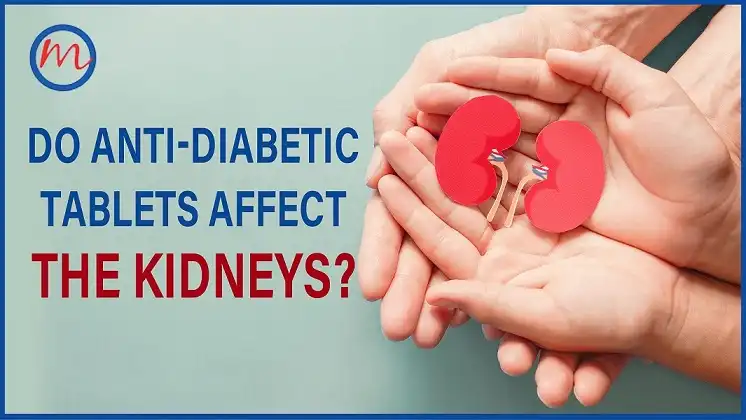Your diabetes medications are safe for your kidney but your uncontrolled diabetes is not.
This article is going to bust certain myths about diabetes and its treatment. It widely believed that diabetes is of two types, ie., type 1 and type 2. Today, there are more than 20 types of diabetes and each carries with entirely different treatments for type 2 diabetes. Hence, before talking about treatment of diabetes it is really important to say which type of diabetes one is talking about. Type 1 diabetes is a totally insulin deficient state where giving injectable insulin is the only currently recommended treatment to sustain life and good health. Monogenic forms of diabetes such as MODY (Maturity Onset Diabetes in Young) have different sub types, each with different treatment strategies. It is unfortunate that many individuals with monogenic diabetes are treated as type 1 diabetes and given life long insulin injections without being properly tested to find the correct type of diabetes. A proper look into the family history of diabetes and genetic testing can help the child / adult with monogenetic forms of diabetes to completely stop insulin injections and be controlled with just tablets alone.
The most common among all forms of diabetes is the type 2 diabetes mellitus (T2DM) and we will deal with type 2 diabetes in the rest of this article.
Why do you get type 2 diabetes?
Multiple factors contribute to the development of type 2 diabetes (T2DM) such as unhealthy lifestyle, genetics etc. Unlike type 1 diabetes, in T2DM, the insulin production from pancreas is relatively well preserved in the initial stages whereas there is more of resistance to action of insulin produced inside the body. This leads to decreased action of the secreted insulin. This insulin resistance is more in obese people and people with more abdominal fat. There is this funny social media post circulating, “It’s not that Diabetes run in your family, it’s that nobody runs in your family”. This is indeed partly true. One of the major contributions to T2DM is obesity and consumption of excessive white rice and calorie rich unhealthy food along with a sedentary lifestyle. If either of your parents or both have diabetes and/or if you are obese you are highly likely to develop type 2 diabetes. If you want to avoid getting or at least postpone getting type 2 diabetes you have to start right now and put your best bet forward which I mean lifestyle modification.
What is the best treatment for type 2 diabetes?
Many might think that this is a discussion on whether insulin or tablets are the best. I would like to say in the treatment of type 2 diabetes is, lifestyle modification is the keystone. Yes! You read it right. Lifestyle modification! With a good healthy lifestyle including proper diabetic diet and daily exercise you can well control your diabetes. But this is more easily stated done. But even this has to be done under proper medical supervision and adequate tests and follow up. There is a scary trend seen nowadays as people are neither ready to do lifestyle modification nor ready to take diabetes medication regularly. They wait for complications to develop or disease to progressed before they take help from a doctor. A combination of lifestyle modification with individualized medication is the best treatment for a type 2 diabetes patient. Unfortunately, ‘social media gurus’ and ‘google doctors’ who believe they know everything, misguide people who bluntly believe whatever is said on social media.
When do complications typically occur in type 2 diabetes?
If diabetes is not controlled properly, within 5-10 years of diagnosis, complications might start in type 2 diabetes patients. A few can have it even at time of diagnosis. This is because type 2 diabetes is a latent disease and is diagnosed late even 5 -10 years of the disorder sets in. That is why diabetes is nick-named “Silent Killer”. First 10 years of your diabetes is the most important in terms of blood sugar control as good control during this time can prevent complications during your whole lifetime. Alas! Most patients neglect their diabetes during this golden period as they don’t get much symptoms even if blood sugars remain uncontrolled. They take help of the doctor only when symptoms start bothering them or interfere in activities of daily life.
Can diabetes medicines affect the kidney or other organs?
The most common doubt we doctors encounter in a diabetes clinic is whether the tablets given for diabetes can affect their kidneys or not? This is mostly due to the spread of misinformation in social media regarding this topic. Also, often people tend to talk or write about a diabetes patient with complications rather than a well controlled diabetic without any complications. People leading a normal life with diabetes seldom get noticed. It is well proven fact by our research that if your diabetes is well controlled from very beginning, you are least likely to get a complication even after 40 or 50 years with diabetes.
What determines whether you get complications or not?
I would like to give you an example before talking about kidneys and diabetes medications. Every disease has a natural history. Take the example of chicken pox. We get fever and body rash first, the fever goes off in a week and the rash take 2-3 weeks to resolve completely in chicken pox. Similarly diabetes has its natural course. Due to uncontrolled diabetes, people may develop complications including kidneys, nerves, eyes, heart, brain etc. The major factor determining this is the level of control of your blood sugars. Since people have been taking tablets for years, they attribute the damage to the kidneys to the tablets they are taking not to the long duration of uncontrolled diabetes they have gone through.
What is the role of tablets in diabetes?
You might have noticed that most cars are provided with seat belts and air bags. These are kept to increase the safety of your journey in case any untoward incidents occur, due to an accident which maybe due to no fault of yours. Tablets are just like these safety measures in your diabetes journey. Tablets are there to control your blood sugars to appropriate levels for your age and physical status. Not only this, certain anti-diabetic tablets have now been proven to protect your kidneys too from any damage. No tablets given for diabetes, does harm to your kidneys if taken in the proper doses under proper medical supervisor.
What are all the tablets that can protect my kidneys?
Almost all medications given for diabetes are safe for your kidneys. Once there is any form of kidney problem your doctor might decrease the dose of certain medications or change few medicines. This is mainly to reduce the workload of your kidneys and due to reduced clearance of any medicine consumed or injected which are excreted through kidneys. Currently there are two classes of medicines which can reduce the progression of kidney disease in selected patients. The SGLT-2 Inhibitor groups of drugs given for diabetes, have been shown to actually protect your kidneys. The decision whether to start these medicines or not are purely dependent on your clinical condition and that your diabetology is the best person to decide this.
What can harm my kidneys?
There are indeed a lot of things you have to be careful about or avoid if you wish to protect yours kidney. Smoking, too much alcohol and not drinking enough water can damage your kidneys. Certain medications, too if taken for months or years can damage your kidneys, eg., a certain classes of pain killers and antibiotics. Intravenously contrast dyes used for doing CT Scans etc can damage your kidneys. Besides, chronic urinary infection, kidney stones, etc., can damage your kidneys. However, if your lifestyle is healthy, blood sugars are kept under control, blood pressure is also kept normal and you follow your doctor advise, then your kidneys are generally safe. Our Chairman, Dr. V. Mohan has published several papers to show that our patients can live upto 90 or even 100 years of age and even after 50 or 60 years of diabetes people can live without complications (https://www.liebertpub.com/doi/10.1089/dia.2019.0219, https://care.diabetesjournals.org/content/36/8/2190.abstract )
Reference
- Mohan V, Anjana RM, Unnikrishnan R, Gupta PPK, Routray P, Jebarani S, Venkatesan U, Uma Sankari G, Gini Venisha K, Ashok Kumar R, Rahulashankiruthiyayan T, Pradeepa R, Rani CSS. Clinical profile of elderly patients (over 90 years) with type 2 diabetes seen at a diabetes centre in South India. Diabetes Technology and Therapeutics. 2020;22:79-84. https://www.liebertpub.com/doi/10.1089/dia.2019.0219.
- Mohan V, Rani CS, Anandakumar A, Dhulipala S, Anjana RM, Parthasarathy B, Unnikrishnan R. Clinical Profile of Long-Term Survivors and Nonsurvivors With Type 2 Diabetes. Diabetes Care. 2013; 36:2190-2197. https://care.diabetesjournals.org/content/36/8/2190.abstract
Dr. ASWIN MUKUNDAN
Chief Consultant
Dr. Mohan’s Diabetes Specialities Centre
Calicut Branch



